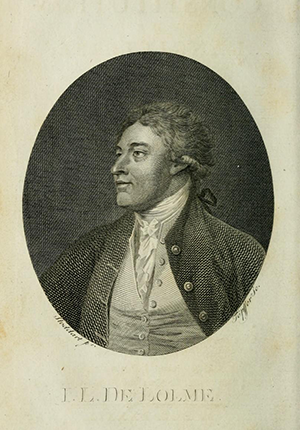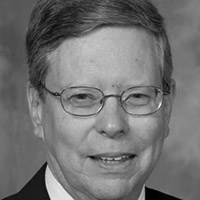Historic Document
The Constitution of England, or, An Account of the English Government (1771-75)
Jean-Louis de Lolme | 1775

University of Ottawa
Summary
Jean-Louis de Lolme (1740-1806) was the author of The Constitution of England, or, An Account of the English Government (1771-75). A lawyer from Geneva who found refuge in Britain, Lolme was a great admirer of the British constitution; and, inspired by Montesquieu’s brief account, he set out to describe its workings in detail. Published initially in French in 1771, his tome appeared in an expanded form in English four years later. There were further revisions; and, with each new edition, the book increased in size until 1784. Lolme’s fine-grained account of Britain’s constitutional balance, his exposition of the principle of representation and the advantages attendant on it, and his spirited defense of unity in the executive, legislative bicameralism, judicial independence, the freedom of the press, and the right to resistance earned him admiration throughout Europe and in America where the framers of the various state constitutions and those of the U.S. Constitution profited from his expertise.
Selected by

Paul Rahe
Professor of History and Charles O. Lee and Louise K. Lee Chair in the Western Heritage at Hillsdale College

Jeffrey Rosen
President and CEO, National Constitution Center

Colleen A. Sheehan
Professor of Politics at the Arizona State University School of Civic and Economic Thought and Leadership
Document Excerpt
Book 1:
Chapter 3:
The Revolution of 1689 is . . . the third grand aera in the history of the Constitution of England . . . . It was at this aera, that the true principles of civil society were fully established. By the expulsion of a King who had violated his oath, the doctrine of Resistance, that ultimate resource of an oppressed People, was confirmed beyond a doubt. By the exclusion given to a family hereditarily despotic, it was finally determined, that Nations are not the property of Kings. The principles of Passive Obedience, the Divine and indefeasible Right of Kings, in a word, the whole scaffolding of false and superstitious notions by which the Royal authority had till then been supported, fell to the ground, and in the room of it were substituted the more solid and durable foundations of the love of order, and a sense of the necessity of civil government among Mankind.
Chapter 4:
The basis of the English Constitution, the capital principle on which all others depend, is that the Legislative power belongs to Parliament alone; that is to say, the power of establishing laws, and of abrogating, changing, or explaining them.
The constituent parts of Parliament are the King, the House of Lords, and the House of Commons.
Book 2:
Chapter 1:
The only Man . . . , who, to those who are unacquainted with the Constitution of England, might at first sight appear in a condition to put the Government in danger, would be a Man who, by the greatness of his abilities and public services, might have acquired in a high degree the love of the people, and obtained a great influence in the House of Commons.
But how great soever this enthusiasm of the public may be, barren applause is the only fruit which the Man whom they favour can expect from it. He can hope neither for a Dictatorship, nor a Consulship, nor in general for any power under the shelter of which he may at once safely unmask that ambition with which we might suppose him to be actuated,—or, if we suppose him to have been hitherto free from any, grow insensibly corrupt. The only door which the Constitution leaves open to his ambition, of whatever kind it may be, is a place in the administration, during the pleasure of the King. If, by the continuance of his services, and the preservation of his influence, he becomes able to aim still higher, the only door which again opens to him, is that of the House of Lords.
But this advance of the favourite of the people towards the establishment of his greatness, is at the same time a great step towards the loss of that power which might render him formidable.
Chapter 3:
It is, without doubt, absolutely necessary, for securing the Constitution of a State, to restrain the Executive power; but it is still more necessary to restrain the Legislative. What the former can only do by successive steps (I mean subvert the laws) and through a longer or shorter train of enterprizes, the latter does in a moment. As its bare will can give being to the laws; so its bare will can also annihilate them: and, if I may be permitted the expression,—the Legislative power can change the Constitution, as God created the light.
In order therefore to insure stability to the Constitution of a State, it is indispensably necessary to restrain the Legislative authority. But here we must observe a difference between the Legislative and Executive powers. The latter may be confined, and even is the more easily so, when undivided: the Legislative, on the contrary, in order to its being restrained, should absolutely be divided. For, whatever laws it may make to restrain itself, they never can be, relatively to it, any thing more than simple resolutions: as those bars which it might erect to stop its own motions, must then be within it, and rest upon it, they can be no bars. In a word, the same kind of impossibility is found, to fix the Legislative power, when it is one, which Archimedes objected against his moving the Earth.
Nor does such a division of the Legislature only render it possible for it to be restrained, since each of those parts into which it is divided, can then serve as a bar to the motions of the others; but it even makes it to be actually so restrained. If it has been divided into only two parts, it is probable that they will not in all cases unite, either for doing, or undoing:—if it has been divided into three parts, the chance that no changes will be made, is thereby greatly increased.
Chapter 5:
[C]ertain Writers of the present age, misled by their inconsiderate admiration of the Governments of ancient times, and perhaps also by a desire of presenting lively contrasts to what they call the degenerate manners of our modern times, have cried up the governments of Sparta and Rome, as the only ones fit for us to imitate. In their opinions, the only proper employment of a free Citizen is, to be either incessantly assembled in the forum, or preparing for war.—Being valiant, inured to hardships, inflamed with an ardent love of one’s Country, which is, after all, nothing more than an ardent desire of injuring all Mankind for the sake of that Society of which we are Members—and with an ardent love of glory, which is likewise nothing more than an ardent desire of committing slaughter, in order to make afterwards a boast of it, have appeared to these Writers to be the only social qualifications worthy of our esteem, and of the encouragement of law-givers. And while, in order to support such opinions, they have used a profusion of exaggerated expressions without any distinct meaning, and perpetually repeated, though without defining them, the words dastardliness, corruption, greatness of soul, and virtue, they have never once thought of telling us the only thing that was worth our knowing, which is, whether men were happy under those Governments which they so much exhorted us to imitate. . . .
What then is Liberty? Liberty, I would answer, so far as it is possible for it to exist in a Society of Beings whose interests are almost perpetually opposed to each other, consists in this, that, every Man, while he respects the persons of others, and allows them quietly to enjoy the produce of their industry, be certain himself likewise to enjoy the produce of his own industry, and that his person be also secure. But to contribute by one’s suffrage to procure these advantages to the Community,—to have a share in establishing that order, that general arrangement of things, by means of which an individual, lost as it were in the croud, is effectually protected,—to lay down the rules to be observed by those who, being invested with a considerable power, are charged with the defence of individuals, and provide that they should never transgress them,—these are functions, are acts of Government, but not constituent parts of Liberty.
To express the whole in two words: To concur by one’s suffrage in enacting laws, is to enjoy a share, whatever it may be, of Power: to live in a state where the laws are equal for all, and sure to be executed (whatever may be the means by which these advantages are attained) is to be free.
Chapter 6:
Exclusively charged with the care of public liberty, the Representatives of the People will be animated by a sense of the greatness of the concerns with which they are intrusted. Distinguished from the bulk of the Nation, and forming among themselves a separate Assembly, they will assert the rights of which they have been made the Guardians, with all that warmth which the esprit de corps is used to inspire. Placed on an elevated theatre, they will endeavour to render themselves still more conspicuous; and the arts and ambitious activity of those who govern, will now be encountered by the vivacity and perseverance of opponents actuated by the love of glory.
Chapter 12:
We may therefore look upon it as a farther proof of the soundness of the principles on which the English constitution is founded, that it has allotted to the People themselves the province of openly canvassing and arraigning the conduct of those who are invested with any branch of public authority; and that it has thus delivered into the hands of the People at large, the exercise of the censorial power. Every subject in England has not only a right to present petitions to the King, or to the Houses of Parliament, but he has a right also to lay his complaints and observations before the Public, by means of an open press. A formidable right this, to those who rule mankind; and which, continually dispelling the cloud of majesty by which they are surrounded, brings them to a level with the rest of the people, and strikes at the very being of their authority.
And indeed this privilege is that which has been obtained by the English Nation, with the greatest difficulty, and latest in point of time, at the expence of the Executive power. Freedom was in every other respect already established, when the English were still, with regard to the public expression of their sentiments, under restraints that may be called despotic. History abounds with instances of the severity of the Court of Star-Chamber, against those who presumed to write on political subjects. It had fixed the number of printers and printing-presses, and appointed a Licenser, without whose approbation no book could be published. Besides, as this Tribunal decided matters by its own single authority, without the intervention of a Jury, it was always ready to find those persons guilty, whom the Court was pleased to look upon as such . . . .
After the Court of Star-Chamber had been abolished, the Long Parliament, whose conduct and assumed power were little better qualified to bear a scrutiny, revived the regulations against the freedom of the press. Charles the Second, and after him James the Second, procured farther renewals of them. . . . [I]t was not till the year 1694, that, in consequence of the Parliament’s refusal to continue the prohibitions any longer, the freedom of the press (a privilege which the Executive power could not, it seemed, prevail upon itself to yield up to the people) was finally established.
In what does then this liberty of the press precisely consist? Is it a liberty left to every one to publish any thing that comes into his head? to calumniate, to blacken, whomsoever he pleases? No; the same laws that protect the person and the property of the individual, do also protect his reputation; and they decree against libels, when really so, punishments of much the same kind as are established in other Countries. But, on the other hand, they do not allow, as in other States, that a Man should be deemed guilty of a crime for merely publishing something in print; and they appoint a punishment only against him who has printed things that are in their nature criminal, and who is declared guilty of so doing by twelve of his equals, appointed to determine upon his case, with the precautions we have before described.
Chapter 14:
It was resistance that gave birth to the Great Charter, that lasting foundation of English Liberty; and the excesses of a Power established by force, were also restrained by force. It has been by the same means that, at different times, the People have procured the confirmation of the same Charter. Lastly, it has also been the resistance to a King who made no account of his own engagements, that has, in the issue, placed on the Throne the family which is now in possession of it.
This is not all; this resource which, till then, had only been an act of force, opposed to other acts of force, was, at that aera, expresly recognized by the Law itself. The Lords and Commons, solemnly assembled, declared, that “King James the Second, having endeavoured to subvert the Constitution of the Kingdom, by breaking the original contract between King and People, and having violated the fundamental laws, and withdrawn himself, had abdicated the Government; and that the Throne was thereby vacant.”
And lest those principles to which the Revolution thus gave a sanction, should, in process of time, become mere arcana of State, exclusively appropriated, and only known, to a certain class of Subjects, the same Act, we have just mentioned, expresly insured to individuals the right of publicly preferring complaints against the abuses of Government, and moreover, of being provided with arms for their own defence. . . .
[A]s the body of the People cannot act without either subjecting themselves to some Power, or effecting a general destruction, the only share they can have in a Government with advantage to themselves, is not to interfere, but to influence,—to be able to act, and not to act.
The Power of the People is not when they strike, but when they keep in awe: it is when they can overthrow every thing, that they never need to move; and Manlius included all in four words, when he said to the People of Rome, Ostendite bellum, pacem habebitis.




